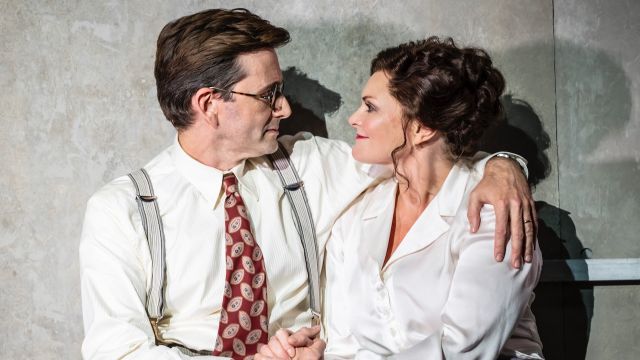Good
1933. Professor John Halder (David Tenant), a specialist in Goethe at the University of Frankfurt, is a ‘good’ man – liberal, rational, moral – or so he thinks. He is initially dismayed by Hitler but figures the Nazis won’t last and all this anti-Jewish thing likewise – it’s just ridiculous. These are ‘rational’ but self-serving opinions.
The title word ‘good’ recurs frequently in this chilling play, each time taking on a heavier burden of irony. ‘Good’ is not a virtue; it’s an advantage. The play is the story of an ‘intellectual’, yes, but in other ways a normal, selfish fellow who drifts, incrementally, rationalisation by rationalisation, into becoming a high-level Nazi. Playwright C P Taylor does not make him an identi-kit ‘representative’ German. Rather he gives Halder his own set of individual circumstances – or difficulties and choices – that nevertheless make his trajectory horrifyingly plausible. And if we think of millions of Halders, each with their own circumstances, but each wanting a ‘good’ life and prepared to extinguish conscience to get it, then we have a comprehensible depiction of the rise and the triumph of the Nazis.

Halder is married to Anne (Sharon Small), a woman who cannot deal with their two children, the house, or anything else. His mother (also Small, who plays all female roles plus some male roles) lives upstairs; she is blind and has Alzheimer’s. These are difficult facts, but we come to realise that for a non-empathetic Halder they are primarily frustrations and irritants. He has even written a novel fantasising about euthanasia… But fortunately – for Halder – he has an adoring student, Helen (Small) with whom he begins an affair. Halder’s friend – indeed his only friend - is Maurice (Elliot Levey), a Jew, who is increasingly anxious about the state of things and not mollified by Halder’s bland reassurances. Halder, meanwhile, is susceptible to flattery, even Nazi flattery, and despite what he might have thought of Hitler, is thrilled that the Fuhrer likes his novel, even writing on a copy, in his own hand, ‘From the heart.’

Director Dominic Cooke does not make things easy for the audience. While Tenant plays Halder throughout, often as a blank, dead-eyed man, registering the increasing evasions and rationalisation, both Small and Levey play multiple roles, sometimes switching mid-sentence, with nothing but a change of voice or posture to signal the change. Cooke does this, I’m inferring, not as gimmick, but to suggest the idea of ‘many in one’, that almost any human being has the potential for evil actions within them. But once we understand this approach – a mere five minutes in, say - we know where we are and to whom Halder is speaking thanks to these two wonderful actors. To see Levey go from Maurice, so terrified he is spewing obscenities, to various smooth-talking Nazi officials, including Eichmann, is extraordinary but convincing. Or Small as the frightened blind mother groping around her room and then switching in an instant to the bad-at-life wife, then the adoring young lover.
Vicki Mortimer’s set encloses most of the Harold Pinter Theatre stage into an unchanging blank concrete cell, suggestive of a gas chamber. There are two hatches: from one pours a torrent of books; behind the other, a blazing furnace. When not playing any character, Levey and Small stay on stage – and blankly watch.

Throughout, Halder is haunted by music – Chopin, Schubert, Wagner, jazz (forbidden by the Nazis), swing and more. Music pops or drifts into his head, unbidden, dreamlike and taking him elsewhere, away from difficult reality. And it is music that provides the climax to the play, an inescapable ending that is all the more confronting for being absolutely real.
As you would realise, this superbly constructed, superbly performed play is as much a reminder and a warning as it is ‘entertainment’. But it is as gripping as watching a long car crash: you can’t look away – even when you know the outcome.

In Berlin today, at Niederkirchnerstrasse 8, the former site of the Gestapo, SS, Sicherheitspolizei, Einsatzgruppen, and so on HQ, there is now the ‘Topography of Terror’ Museum’. It includes an extensive gallery of photographs from the Nazi era – people being herded onto trucks at gunpoint, etc. - accompanied by matter-of-fact captions. These captions remind the visitor repeatedly that Nazi policies were supported by a large majority of the German population. Motives are not specified, but there was national pride after the humiliation of Versailles, order after the chaos of the twenties, full employment, consumer goods… All good. Antisemitism, yes, in some people, but also groupthink, or simply the fear that makes us just go along, or, like Halder, rationalising one’s way into what was ‘good’ for one.
As New York Mayor (1934-46) Fiorello La Guardia replied when asked if fascism could come to America, ‘No, we’ll call it something else.’
Michael Brindley
Photographer: Johan Persson
Subscribe to our E-Newsletter, buy our latest print edition or find a Performing Arts book at Book Nook.

